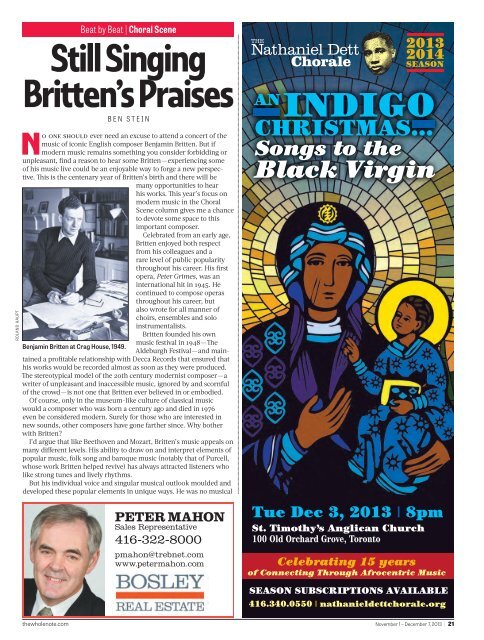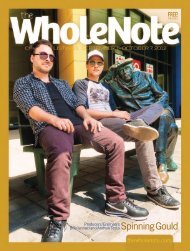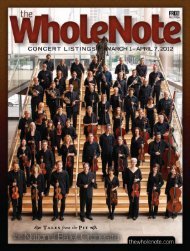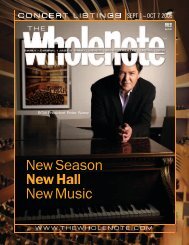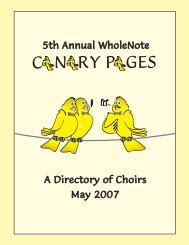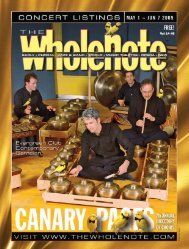PDF version - The Wholenote Magazine
PDF version - The Wholenote Magazine
PDF version - The Wholenote Magazine
Create successful ePaper yourself
Turn your PDF publications into a flip-book with our unique Google optimized e-Paper software.
Beat by Beat | Choral SceneStill SingingBritten’s PraisesBEN STEINROLAND HAUPTNo one should ever need an excuse to attend a concert of themusic of iconic English composer Benjamin Britten. But ifmodern music remains something you consider forbidding orunpleasant, find a reason to hear some Britten — experiencing someof his music live could be an enjoyable way to forge a new perspective.This is the centenary year of Britten’s birth and there will bemany opportunities to hearhis works. This year’s focus onmodern music in the ChoralScene column gives me a chanceto devote some space to thisimportant composer.Celebrated from an early age,Britten enjoyed both respectfrom his colleagues and arare level of public popularitythroughout his career. His firstopera, Peter Grimes, was aninternational hit in 1945. Hecontinued to compose operasthroughout his career, butalso wrote for all manner ofchoirs, ensembles and soloinstrumentalists.Britten founded his ownBenjamin Britten at Crag House, 1949.music festival in 1948 — <strong>The</strong>Aldeburgh Festival — and maintaineda profitable relationship with Decca Records that ensured thathis works would be recorded almost as soon as they were produced.<strong>The</strong> stereotypical model of the 20th century modernist composer — awriter of unpleasant and inaccessible music, ignored by and scornfulof the crowd — is not one that Britten ever believed in or embodied.Of course, only in the museum-like culture of classical musicwould a composer who was born a century ago and died in 1976even be considered modern. Surely for those who are interested innew sounds, other composers have gone farther since. Why botherwith Britten?I’d argue that like Beethoven and Mozart, Britten’s music appeals onmany different levels. His ability to draw on and interpret elements ofpopular music, folk song and baroque music (notably that of Purcell,whose work Britten helped revive) has always attracted listeners wholike strong tunes and lively rhythms.But his individual voice and singular musical outlook moulded anddeveloped these popular elements in unique ways. He was no musicalPETER MAHONSales Representative416-322-8000pmahon@trebnet.comwww.petermahon.comthewholenote.com November 1 – December 7, 2013 | 21


